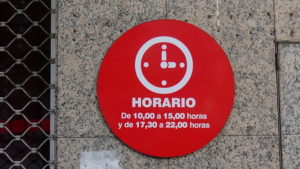This post is also available in:  Spanish
Spanish
There are adjustments you mightn’t expect to make when you first think about moving abroad. They’re usually the bigger things like language barrier, whether or not you’ll like the food, or huge cultural differences like religious influences or products you anticipate you won’t have access to (for example, I knew, based on prior research, tampons were really difficult to find in Thailand, so I brought a bunch with me). But there are some adjustments to make living abroad you just don’t know to plan for. And for me, a few of them even caught me off guard.
1. Conversions
I’m an American. And yes, for better or worse, Americans calculate measurements differently (PS: we still don’t know why). So when I first moved abroad and I realized I had to constantly switch from the metric system to feet, miles, and pounds, it made my head spin.
In Spain, when somebody said “It’s going to be 21 degrees tomorrow,” not only did I have to translate from Spanish to English, there was the extra step of Spanish to English, Celsius to Fahrenheit.
Then there’s centimeters to inches, kilograms to pounds, milliliters to ounces.
Maybe you’re smarter than I am and can adjust quickly to this, but if you’re anything like me, it’ll take practice. I’d often make a joke of it because, well, there was nothing else to do.
To adjust well
- Use an app. I use ConvertFree, because, well, it’s free. It also allows you to type in the conversion you need directly and switch it.
- Change the settings on your phone. You’ll see the new measurements so frequently, you’ll start to train your mind to make automatic associations (like the temperature and military time instead of AM/PM).
- Learn some quick mental math hacks, like rounding or making rough approximations.
I can do Fahrenheit to Celsius pretty quickly now because I’ve taken to using benchmarks, like 21ºC is about 70ºF or 0ºc is about 30ºF. Height in centimeters I’m still working on.
2. Hanging Laundry
Also because I’m American, it’s natural for me to use a machine for everything. Washers and dryers are usually sold in pairs and most households have both. But when I moved abroad, the classic American idea of quick and convenient household appliances wasn’t as prominent.
I had to learn to hang my laundry, one piece of clothing at a time, and sometimes wait days for the clothes to be fully dry, instead of just throwing the whole batch into the dryer all at once and an hour later they’d be ready.
To adjust well
- Check the weather. If you can manage it, don’t do laundry on rainy days. (Sometimes it can’t be helped, but I try to stay with laundry on sunny days.)
- Wash fewer clothes. If you have too many clothes in one batch 1) there might not be room to hang all of it and 2) they won’t dry as well.
- Have a system. If you have a hanging rack, hang your pants in one spot and shirts in another and stick to where you know it will fit. The worst is when you’re hanging your laundry and you run out of room!
- Find the joy in doing chores a little more slowly. I’ve learned to enjoy the process. I also love the image of my neighbor’s white sheets hanging to dry on a sunny day.
3. Ordering Coffee and Water
Coffee
Ordering food is something you learn in language classes, and yes, ordering coffee is sometimes, too. But even in the US, there’s a certain lingo that belongs to ordering coffee (especially at Starbucks).
Water
Most restaurants in America give you water from the tap with ice (always with ice, unless you ask for it without) free of charge. In Europe, it’s not quite as common for restaurants to offer free water, so you have to ask for it. If it’s from the tap, usually it’s free, but it won’t come with ice. If you want to buy it, sometimes you have to specify if you want it room temperature or cold, with gas (mineral) or not.
To adjust well
- Do some research. How do people in the country you’re going to order coffee? How do you order it at home? Is it the same? What’s the water situation like? Are people warning you not to drink the tap water? What about the ice? It’s good to consider these questions, especially about the water, before you go.
- Learn the lingo. If you can’t do it ahead of time, ask someone in your host country to help you. You’ll probably catch on quickly, but at least now you know to pay attention when ordering.
4. Money Transfers
If you have bills to pay at home (hello, American student loan debt!) while you’re working abroad and making a foreign income, money transfers are something you’ll have to learn pretty quickly.
When you first arrive in your host country, you won’t have a bank account, which you’ll need to make money transfers. You also won’t be able to open a bank account until you have a more permanent visa. This could take from one month to longer.
To adjust well
- Plan to have some savings to cover your bills for at least the first two, if not three months.
- Once you do get a bank account, look into something called Transfer Wise. It’s a great service that charges minimal to no fees for transferring money from yourself to yourself. (The Western Union won’t let you send money to yourself because you aren’t physically on the other side to pick it up.)
- Budget your host country income to include what you’ll transfer.
- Automate or manually transfer what you budgeted to your home country bank account. Make sure you do this well before any due dates.
- Plan for delays in transfers. Transfer Wise usually takes about two to three days to transfer. Banks take much longer, almost a full business week. Once the money arrives, you can pay your bills like normal. Yay, adulting!
5. Schedules
Schedules affect almost every inch (or centimeter) of my day overseas. Here are a few things that I didn’t quite expect that affected the way I live almost immediately when I moved to Spain: Start and end times are guestimates, for buses, classes, store hours, meeting times.
Stores and most businesses close from roughly 2:30 to 4:30 PM for lunch. Because lunch is late, dinner is late, too, around 9, 10, or even 11 PM. Everything is closed on Sundays.
The list goes on.
To adjust well
- Try not to get frustrated. Okay, get as frustrated as you want, but then find a solution that will help you make peace with it. If the bus is always late, read a book or catch up on your language learning while you wait. If it’s the opposite and everything is always on time, leave your house 10 minutes earlier.
- If you have to adjust to a new meal schedule, find some healthy snacks, like almonds, to keep you satiated during the interim hours. At noon, I usually have a snack to tide me over until lunch at 3 PM.
Some adjustments, among many other things, will be difficult to get used to while living abroad. But just remember, this is why you went in the first place! Even if there are difficulties in some small things, there is great joy when you’ve succeeded in overcoming them.





